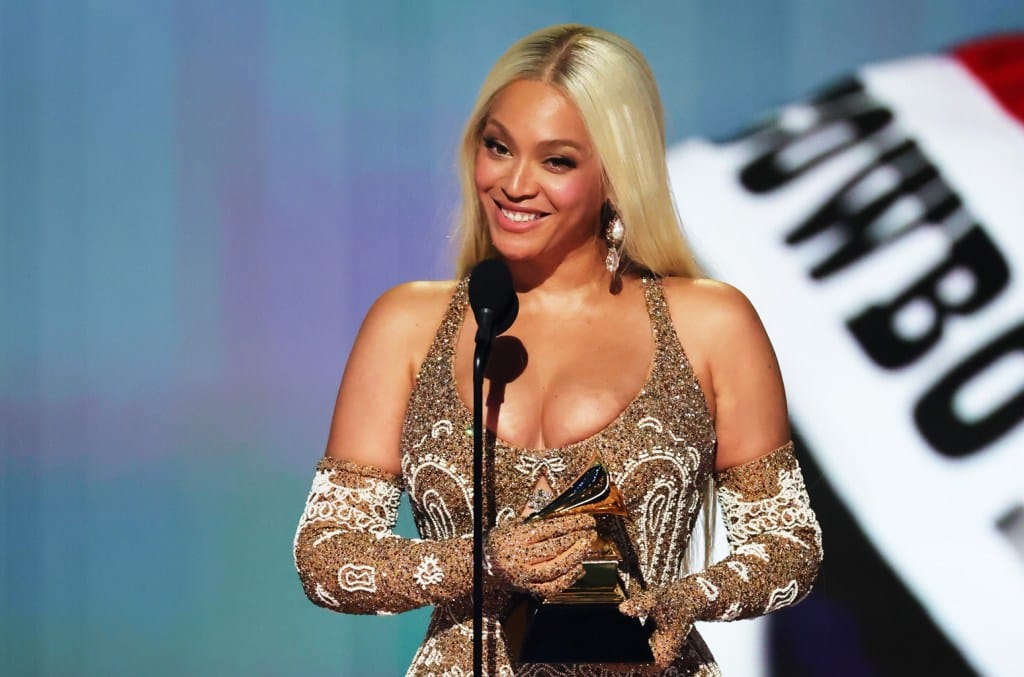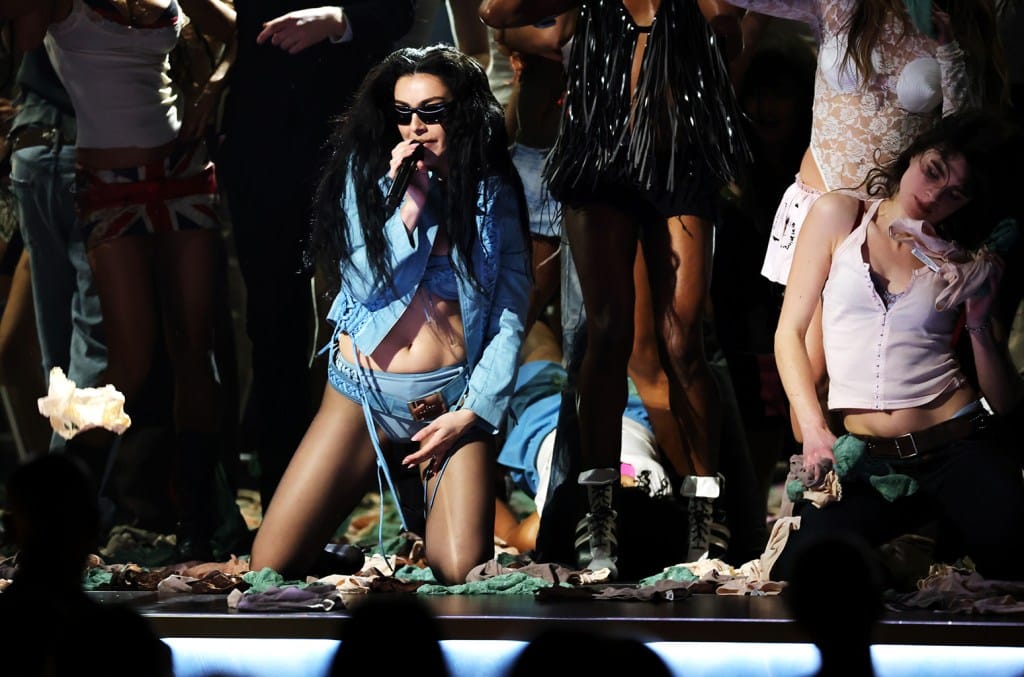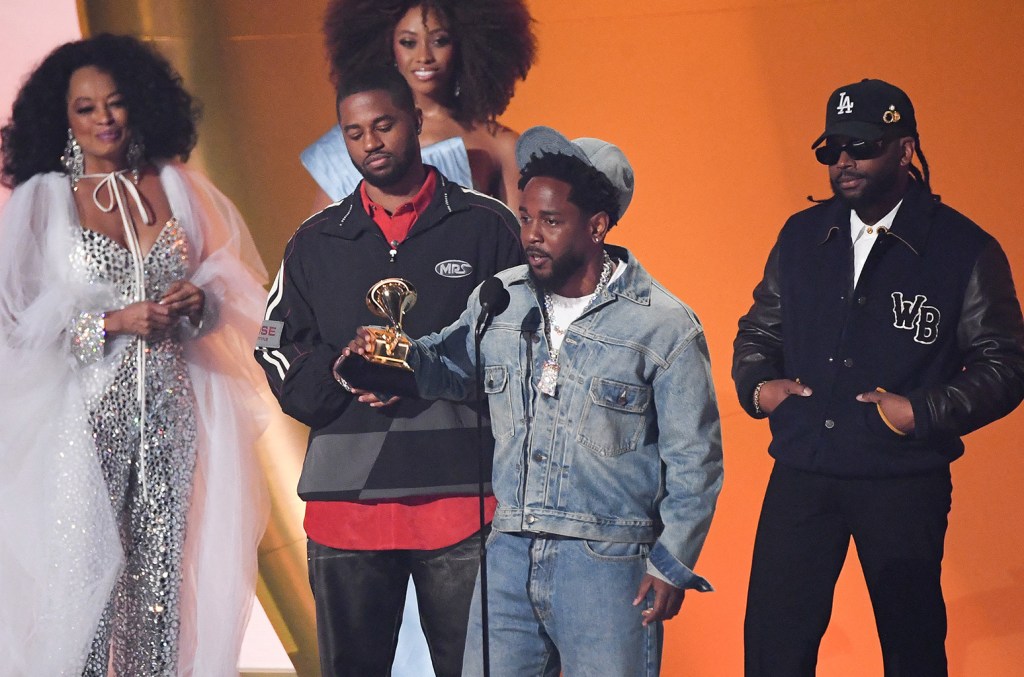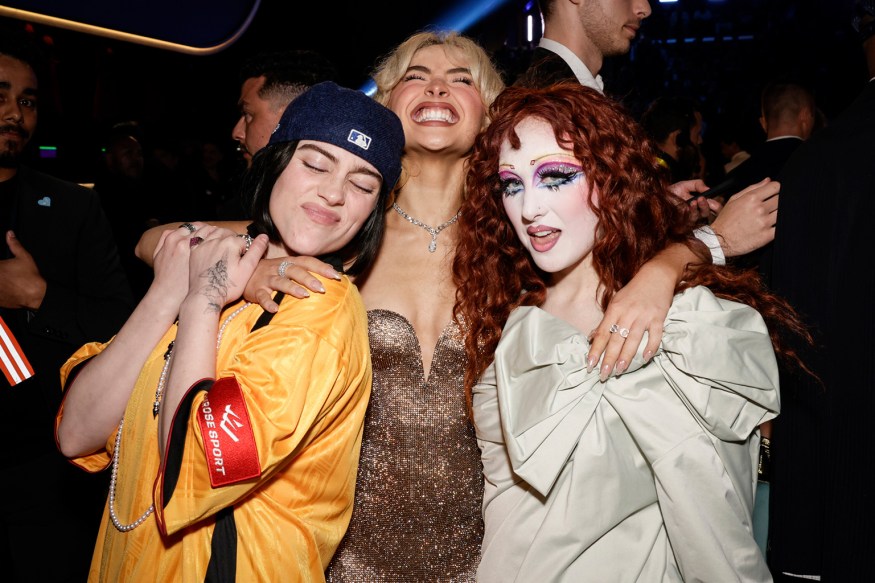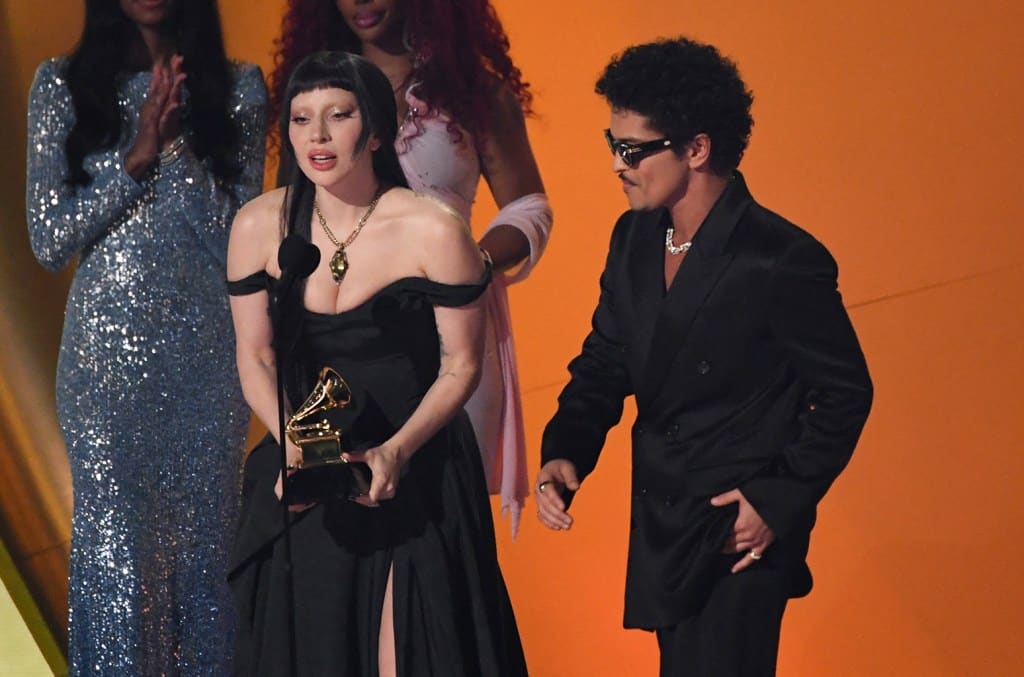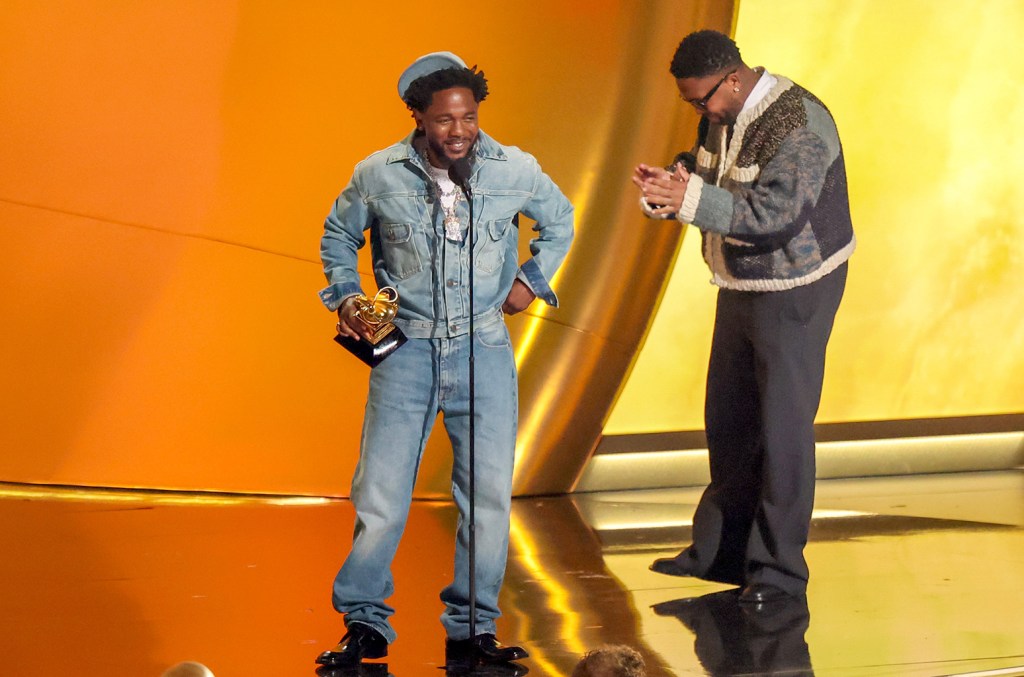Grammys
Page: 10
Beyoncé finally won the Grammy for album of the year at the 67th annual Grammy Awards on Sunday (Feb. 2) for her country project Cowboy Carter. The win followed four previous losses in the category, for I Am…Sasha Fierce, Beyoncé, Lemonade and Renaissance.
Beyoncé is just the fourth Black woman to win album of the year as a lead artist, following Natalie Cole, Whitney Houston and Lauryn Hill. (Two of these women won for stylistic departures – Cole for her warm embrace of the traditional pop songs made famous by her father, Nat “King” Cole, and Bey for an album which sought to bring attention to Black artists’ overlooked role in country music history. Beyoncé won a total of three awards on the night, extending her record as the artist with the most wins ever to 35.
Cowboy Carter is the first country album to win album of the year since Kacey Musgraves’ Golden Hour six years ago. Cowboy Carter didn’t receive a single nomination at the Country Music Association Awards in November. The same thing happened with The Chicks’ album Taking the Long Road, which won album of the year at the Grammys in 2007 despite being blanked at the CMA Awards. It is believed to have swept the Grammys because voters were making a point about freedom of speech, amid the severe backlash the group experienced following Natalie Maines’ critical comments about President George W. Bush. Note: The Chicks were nominated for vocal group of the year at the CMAs the following year.
Trending on Billboard
Lamar was the year’s top Grammy winner, with five wins, followed by Sierra Ferrell, with four; Beyoncé, Charli XCX and St. Vincent, with three each; and Jon Batiste, Sabrina Carpenter, Gustavo Dudamel, Samara Joy and CeCe Winans, with two each.
Kendrick Lamar’s “Not Like Us” won record of the year, becoming just the second rap smash to win in the category. It follows Childish Gambino’s “This Is America” in 2019. This is the second time in four years that Black lead or co-lead artists have won both album and record of the year in the same year. On the 2022 telecast, Jon Batiste won album of the year for We Are. Silk Sonic, with Anderson .Paak alongside Bruno Mars, won record of the year for “Leave the Door Open.”
Chappell Roan won best new artist. This is the eighth consecutive year that a female solo artist has won best new artist. That constitutes the longest winning streak by women artists in the history of the category, topping the seven-year winning streak that extended from 1997 to 2003.
Amy Allen became the first woman to win the award for songwriter of the year, non-classical. The first two winners in the category were Tobias Jesso Jr. and Theron Thomas.
Daniel Nigro won producer of the year, non-classical. He was first nominated in the category last year, when the award went to Jack Antonoff (who was not nominated this year).
Elaine Martone won producer of the year, classical for the third time. She’s the third woman to win the award, joining Judith Sherman (seven wins) and Joanna Nickrenz (two wins). Note that women producers have won 12 times in this category, compared to zero times in the producer of the year, non-classical category – which had a five-year head-start on the classical producer award.
Sabrina Carpenter won best pop vocal album for Short n’ Sweet. She beat three past winners in the category – Taylor Swift (who has won it twice), Ariana Grande and Billie Eilish, as well as the red-hot Chappell Roan. That’s what you call a stacked category.
Lady Gaga and Bruno Mars’ “Die With a Smile” won best pop duo/group performance. It’s Gaga’s record third win in the category. She previously won for “Shallow” with Bradley Cooper in 2019 and “Rain on Me” with Ariana Grande in 2021. That was Mars’ 12th consecutive Grammy win without a loss. Alas, Mars’ winning streak came to an end on the live telecast when “Die With a Smile” lost song of the year. Still, 12 wins in a row without a loss ain’t bad.
The Beatles won best rock performance for “Now and Then.” This is the group’s first win in a rock category. (The Grammys didn’t have categories dedicated specifically to rock until the 1980 ceremony.) Most would call “A Hard Day’s Night” a rock performance, but it won in the genre-less category of best performance by a vocal group. The Grammys had rock categories when “Free as a Bird” won a Grammy in 1997, but it won instead for best pop performance by a vocal group.
The Rolling Stones’ Hackney Diamonds won best rock album. The Stones were the first winners in the category when it was first presented in 1985, for their album Voodoo Lounge. This is the first time that The Beatles and The Stones, the two top rock groups of the 1960s, have won Grammys in the same year.
St. Vincent’s All Born Screaming won best alternative music album. It’s her third win in the category, which puts her in a tie with Beck, Radiohead and The White Stripes for the most wins in the category’s history. She also won best alternative music performance for “Flea” and best rock song for “Broken Man,” two tracks from the album.
Doechii’s mixtape Alligator Bites Never Heal won best rap album. Doechii is just the third woman to win in this category, following Lauryn Hill (as part of Fugees, for their second album, The Score) and Cardi B, for her debut album, Invasion of Privacy. In a fitting touch, Cardi B presented Doechii with the award. Doechii beat Eminem’s The Death of Slim Shady (Coup De Grace). Em has won six times in this category, and in fact had only lost once before – when Ye’s Late Registration beat Encore in 2006.
Norah Jones’ Visions won best traditional pop vocal album, 22 years after she won best pop vocal album for Come Away With Me. Jones is the fifth artist to win in both of these categories, following Joni Mitchell, Lady Gaga, James Taylor and Paul McCartney (counting an early pop album award with The Beatles).
Chris Stapleton won best country solo performance for a record-extending fifth time. That’s more than double the tally of the next two winners combined. Carrie Underwood and Willie Nelson have each won twice since this gender-neutral category was introduced in 2012.
Beyoncé featuring Miley Cyrus won best country duo/group performance for “II Most Wanted.” It’s the first time that two artists from outside the country world have won for a collaboration in that category. Pentatonix and Justin Bieber have each won in the category, but for collaborations with core country artists – Dolly Parton and Dan + Shay, respectively.
Kendrick Lamar became the first artist to win best music video three times. He won this year for “Not Like Us,” having previously won as a featured artist on Taylor Swift’s “Bad Blood” and for his own video “Humble.” Lamar was among the video directors on both “Humble.” and “Not Like Us.”
Lamar also won a record-extending seventh time for best rap performance. And he won best rap song for the fifth time, a tally topped only by Ye (with seven wins).
Cowboy Carter also won best country album. Beyoncé is the first Black artist to win in that category.
The late Chick Corea won best jazz instrumental album for Remembrance, a collab with Béla Fleck. It’s Corea’s 28th Grammy, which puts him in a tie with the late Quincy Jones for third place on the all-time Grammy leaderboard. They are topped by just two artists – a total topped by Beyoncé (35) and Sir Georg Solti (31).
Jay-Z won his 25th Grammy for his work as a songwriter on Cowboy Carter. This allows him to stand alone as the rap artist with the most Grammys – 25. He was formerly tied for that distinction with Ye.
Sean Ono Lennon won a Grammy for best boxed or special limited edition package for a reissue of his father John Lennon’s 1973 album Mind Games. Both of the younger Lennon’s parents are multiple Grammy winners. John Lennon won seven Grammys. Yoko Ono has won two. They shared the album of the year award in 1982 for their collaborative album, Double Fantasy.
Jimmy Carter’s Last Sunday in Plains: A Centennial Celebration won best audio book, narration and storytelling recording. It’s the late president’s fourth Grammy win. Carter has won more Grammys than any other U.S. president. Bill Clinton and Barack Obama are runners-up with two wins each. Carter has won all four of his Grammys in this category, which is more than anyone else in the category’s history. Maya Angelou is second with three wins. Carter died at age 100 in December.
Hell’s Kitchen won best musical theater album. Alicia Keys won as one of the album’s producers. It’s her 17th Grammy. Keys also won the honorary Dr. Dre Global Impact Award.
Dave Chappelle’s The Dreamer won best comedy album. It’s his sixth win in the category, which puts him just one behind longtime category leader Bill Cosby. Chappelle pulls ahead of George Carlin and Richard Pryor, with five wins each.
Hans Zimmer’s Dune: Part Two won best score soundtrack for visual media (includes film and television). This makes up for the fact that the score wasn’t allowed to compete in this year’s Oscar voting process because it was judged to have leaned too heavily on Zimmer’s score for the first Dune. This is Zimmer’s third win in this Grammy category, following Crimson Tide and The Dark Knight, a collab with James Newton Howard.
The Taj Mahal Sextet won best traditional blues album for Swingin’ Live at the Church in Tulsa. The win came less than 24 hours after Taj Mahal received a lifetime achievement award from the Recording Academy at their annual Special Merit Awards.
The deluxe edition of Bob Marley: One Love – Music Inspired by the Film won best reggae album. Among the albums the soundtrack beat this year: Evolution, the latest album by Marley’s band, The Wailers. Marley never won a Grammy in competition – the Grammys didn’t introduce a reggae album category until 1984, three years after Marley’s death. The Academy awarded Marley a lifetime achievement award in 2001.
Gillian Welch and David Rawlings’ Woodland won best folk album – the pair’s second win in the category. They previously won in 2021 for All the Good Times. They are the second two-time winner in the category, following Chris Thile.
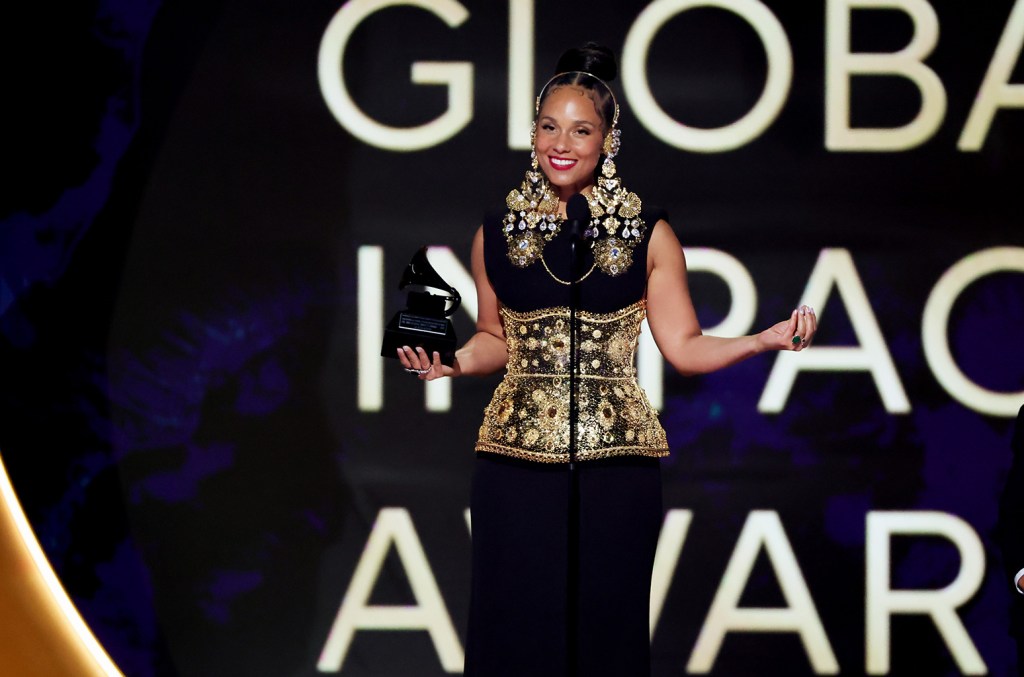
Alicia Keys accepted the Dr. Dre Global Impact Award at the 2025 Grammys Sunday night (Feb. 2). It was the second award she took home that evening, as her Broadway musical Hell’s Kitchen won the Grammy for best musical theater album, bringing Keys’ overall total to 17.
Queen Latifah presented the award and hailed the musician as a “constant inspiration through her voice, her talent, but most importantly, through her heart.” As she commanded the audience to properly congratulate the “Girl on Fire” hitmaker, the iconic rapper and actress yelled, “Make some noise, this girl is on fire!”
“I just want to give big love to my brother Dr. Dre who created a sound that began a movement, and your sound told me that if you’re a creative growing up in Compton or Hell’s Kitchen, you can touch the world,” Keys said. “I always had to fight for a certain level of respect as a songwriter, a composer and especially a producer. It’s strange that we don’t think of women as producers like Quincy or Dre or Swizzy, but female producers have always powered the industry.” Keys shouted out Patrice Rushen, Missy Elliott, Linda Perry, Grimes and Solange, to which the latter’s sister Beyoncé clapped.
The “Fallin’” artist continued to celebrate the other “superpower, groundbreaking, risk-takers” she’s worked with over the years, such as Roc Nation CEO Desiree Perez and Universal Music Publishing Group CEO Jody Gerson, the latter of whom won the 2025 Industry Icon Award at Clive Davis’ Pre-Grammy Event Saturday night. “They saw in me what I didn’t see in myself, and we started She Is the Music to open the doors for other women who didn’t get the opportunities or credit they deserve. So this is for all the ladies that know the magic that they bring to the room,” she added.
She also criticized President Donald Trump’s executive orders rolling back diversity, equity and inclusion (DEI) initiatives. “This is not the time to shut down a diversity of voices. We’ve seen on this stage talented, hard-working people from different backgrounds with different points of view, and it changes the game. DEI is not a threat — it’s a gift,” Keys said while the audience roared with applause. “The more voices, the more powerful the sound. When destructive forces try to burn us down, we rise from the ashes like a phoenix. And as you see tonight, music is the unstoppable language that connects us all.”
It’s OK to just admit that you’re jealous of Charli XCX — she did just close out the 2025 Grammys with the final performance of the night, after all. Performing a medley of two of the most beloved tracks on her album Brat, the star kicked things off outdoors in the Crypto.com Arena driveway, popping […]
In 2024, Grammy-winner Mustard had a year that reminded the world why he was the hottest beatmaker on the planet a decade prior. Thanks, in large part, to the seismic success of Kendrick Lamar’s “Not Like Us” — the Billboard Hot 100-topping KO punch Lamar threw Drake near the end of their culture-shifting beef – Mustard notched a pair of 2025 Grammy nods: record of the year and producer of the year, non-classical.
It’s the first time Mustard has earned a nod in the latter category, a testament to both his longevity and the strength of his non-“Not Like Us” 2024 work, like the Faith of a Mustard Seed album, which hit No. 11 on R&B/Hip-Hop Albums. “Not Like Us” is, of course, the song everyone is thinking about going into Lamar’s highly anticipated Super Bowl LIX Halftime Show performance: Between Drake’s ongoing lawsuit against UMG and the Grammys, “Not Like Us” has remained at the center of the cultural conversation — even as several hits circulate from K.Dot’s Billboard 200-topping GNX LP, which also includes the No. 2 Mustard-helmed smash “TV Off” (with Lefty Gunplay).
Trending on Billboard
At the 67th Annual Grammy Awards, “Not Like Us” won all five of its nominations: best rap song, best rap performance, best music video, song of the year and record of the year.
While Mustard himself isn’t totally convinced he’ll be joining Kung Fu Kenny for the halftime show on Feb. 9, this year’s Super Bowl will still be a special one for the LA-bred producer. During the Grammy telecast (Feb. 2). Heinz and Mustard announced the first-ever Mustard x Mustard remix, an endeavor that will last the entire year and include Heinz’s first-ever co-created product. Dubbed a “secret sauce,” Mustard’s custom new condiment marks the first new national Heinz Mustard innovation in nearly ten years.
“I’ve been ‘mustard’ since I was born, my real name is Dijon,” he tells Billboard. “I’ve always wanted to work with Heinz and I only use Heinz. Ironically, I have a Heinz DJ Mustard chain that cost me a lot — I actually spent all of my money on it when I got my first check. I don’t wear it as much no more, but that was my first-ever chain. This could have happened a long time ago, but now is the perfect time. I was 340 lbs. back then, I’m on the leaner side now so I’m looking good; If I ever got to do some commercials, I look better now!”
Read what else Mustard had to say about the Super Bowl, “Not Like Us” and the best food to pair his new secret sauce with.
What felt different this time around at the Grammys compared to the previous years you’ve been nominated?
I’ve never been nominated for this many Grammys in one year. It’s definitely scary but exciting. And producer of the year, man. That’s one of the ones that means a lot. Everything is different about this year for me.
What was your initial reaction when you saw your name on that lineup for producer of the year, non-classical?
I was more worried about “Not Like Us” being nominated, so I [wasn’t even thinking about that category]. I don’t want to say I forgot about producer of the year, but I’ve never been nominated for it, so I never even thought it could happen. At this point, so many years have passed. I don’t think I was even looking for that; it was one of the first ones that popped up, and I just started going crazy because it was just so unexpected. I was like, “What the hell?!” I just couldn’t believe it.
It’s wild to hear that you were more worried about “Not Like Us.” Was there a world in your head in which that track got no love at the Grammys?
I think that I’m optimistic about anything; I don’t feel entitled about anything. I’m grateful that we got nominations, but a part of me in the back of my mind was like, “What if we don’t?” I never feel like I’m just supposed to get [recognition]. Although we have a song that is really huge, I feel like people sometimes have a problem with entitlement. I want whatever I deserve, but I don’t feel like it has to be given to me.
What track from Faith of a Mustard Seed are you most proud of from a production standpoint?
“Pray for Me.” [I’m] rapping [on there and that’s] definitely something that I didn’t see myself doing or wasn’t planning on doing. It’s very personal and vulnerable. I always go for the things that make me super nervous, because that’s the stuff that takes the most courage to do. I’m very proud of that one.
How does it feel to have a battle track nominated for record of the year?
[Chuckles]. It feels great. I always think about the song and my legacy. I always think about Jay-Z and Nas and how we still talk about that beef. People are going to talk about this forever, and I don’t know how to feel about it. I’m still in the moment. Every time I think about it, I’m like, “Damn, that’s crazy.”
What’s the most random place you’ve heard “Not Like Us” playing?
My daughter’s school. She’s nine and she had a dance recital. It was definitely the clean version, but they danced to it and she was in front. I was like, “Whoa, this is pretty crazy!”
Would you ever make the “MUSTAAAARRRD” ad-lib from “TV Off” a recurring one?
I think it’s something I would do. If I did do that, I would use it on a song with Kendrick — I don’t know that I would just start passing around that tag, it’s really special.
Can we expect an appearance from you during the halftime show?
I’m gonna go watch the game, but I’m not saying I’m performing, because I don’t think I am. I have no idea about any of that. I don’t actually talk to Kendrick about stuff like this. I recently texted him a voice note where I was singing “Euphoria” [and gassing him]. We talk about stuff like that. I’m not asking him like, “Hey man, can I perform with you?” I’m not asking no s—t like that. But if he did call me up and invite me, I would say “Hell yeah!” As of right now, you can’t expect me on the halftime show. But you can expect me in a box!
Out of all the songs that you and Kendrick have collaborated on, which one would you most like to see perform?
All of them! I mean, “Not Like Us,” man. It would just be crazy to see. If he does “TV Off,” I get the shout-out. If he does “Not Like Us,” I still get the shout-out! I like ‘em all the same. I really would love him to perform “Hey Now.” But if he doesn’t, I’ll be good with whatever he does.
After the year the West Coast had in 2024, what does it feel like to watch Kendrick lead a victory lap on the Super Bowl stage?
It feels great that Kendrick is really putting the West Coast back in the forefront. He’s giving people like me opportunities to shine; even though SZA’s not from Los Angeles, she’s adopted, she’s with us. And all the people that he put on his [GNX] album; he really cares about the West Coast. That’s the part that people don’t really see. For him to be that big, putting people like Lefty Gunplay and AzChike and Peysoh on tracks… he really gave people looks, and people don’t do that often. People don’t grab the youngest person that nobody knows.
What can you tell us about the secret sauce?
Nothing, it’s a secret! It’s one-of-a-kind. I think people are gonna love it. Whenever I end up deciding, it’s gonna be that.
What’s the best food item to pair with the limited-edition mustard?
I’m a mustard of all trades, so I like to say, “everything.” You can do some lemon pepper chicken strips maybe, or some hot wings, all flats, extra crispy. I got flavor in every aspect.
What’s your favorite type of mustard?
All of them, but I don’t really like spicy like that. I’m not a spicy person. I can do a little kick now, but I can’t do crazy burning hot. I can do Hot Ones with some ranch dressing or something to cool it off. I can’t tell you my favorite mustard, though — because if I told you that, then you probably know a little bit of my secret sauce. And I know you’re trying to figure it out!
I use them all, depending on what we’re doing. If we grilling, we going regular yellow mustard for the hot dogs and hamburgers. I’m also using yellow for the binder on the ribs now. Now if I’m getting out the fry basket, I’m using yellow mustard for the binder on the chicken!
Shortly after taking home the Grammy for record of the year, Kendrick Lamar returned to the stage at Crypto.com Arena to accept his second Big Four Grammy for song of the year on Sunday night (Feb. 2) for hit breakout hit “Not Like Us.”
The award was presented by the legend Diana Ross, who offered a somber reflection on the goings on of the world. “How can we have the balance between celebrating and being filled with sorrow? Even as we face trials and tributes with our soul, music brings us home,” she told the audience. “You are not alone, we stand with you, my heart reaches out to you.”
Appearing from backstage after taking home the prize for record of the year, Lamar immediately started beaming about being handed his second trophy of the evening by The Boss herself. “Damn, that’s Diana Ross,” he said with a laugh. “I’m starstruck.”
Trending on Billboard
After letting his crew get a few words in (including Mustard declaring “somebody get the broom out” for his partner’s apparent sweep), Lamar took a moment to pay tribute to the West Coast rap stars who helped build the lane he occupies today. “All the West Coast artists, from early on — G Malone, Problem, Bad Lucc, K-Bo, Daylyt … these are the cats that inspired me to be the MC I am today,” he said. “Schoolboy, J-Roc, Ab-Soul, this is what it’s about, man. Because at the end of the day, nothing more powerful than rap music — I don’t care what it is. We are the culture.”
With his final words, Lamar offered one final message to any up-and-coming rap artists watching. “To all the young artists, like my man Punch say, I just hope you respect the art form,” he said. “It’ll get you where you need to go.”
At Sunday night’s ceremony, Beyoncé led the pack of nominees with a whopping 11 nods, with Charli XCX, Billie Eilish, Lamar himself and Post Malone tied for the second most nominations with seven each. Meanwhile, the jam-packed show included performances from stars such as Chappell Roan, Sabrina Carpenter, Doechii, Lady Gaga, Bruno Mars, Benson Boone and plenty of others.
Check out the biggest moments from the 2025 Grammy Awards.

As the 2025 Grammys began to draw to a close on Feb. 2 in Los Angeles, Coldplay lead singer Chris Martin teamed with guitarist Grace Bowers to honor the lives and careers of the musicians, artists and executives who passed away over the past year. The segment opened with footage of late One Direction band […]
Shakira celebrated her 48th birthday at the 2025 Grammys held at the Crypto.com Arena in Los Angeles on Sunday (Feb. 2), where she won a Grammy award and performed live. Gloria Estefan had the honor to introduce the “global superstar … the one and only, the incomparable, Shakira,” prior to a short tribute video in which the […]
Lady Gaga and Bruno Mars added to their trophy collection at the 2025 Grammy Awards Sunday (Feb. 2) when they won best pop duo/group performance for their Billboard Hot 100 chart-topping song “Die With a Smile.” Gaga and Mars shared the stage and rejoiced after winning over Beyonce and Post Malone, Gracie Abrams and Taylor […]
The wins keep coming for Kendrick Lamar. Not only did the TDE rapper score three Billboard Hot 100 No. 1s last year, but one of those songs – “Not Like Us” – just nabbed him the Grammy Award for record of the year at the 2025 ceremony on Sunday (Feb. 2) evening. The Drake diss […]

 State Champ Radio
State Champ Radio 